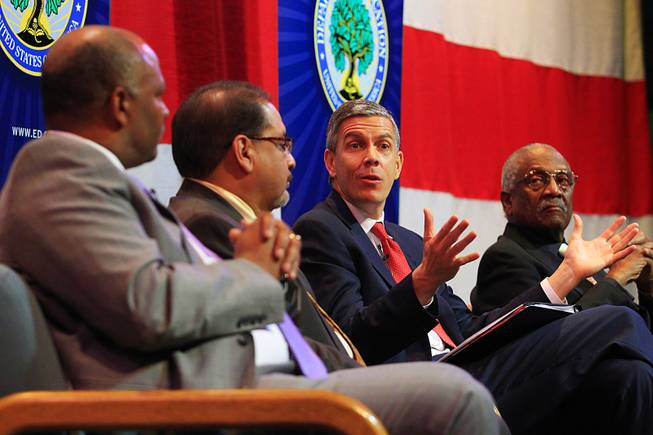
U.S. Secretary of Education Arne Duncan answers a question during a town hall-style meeting about education Tuesday, Nov. 29, 2011, on the CSN Cheyenne campus.
Wednesday, Nov. 30, 2011 | 2 a.m.
Sun Topics
The key to economic recovery is improving the quality of the education system, U.S. Secretary of Education Arne Duncan told nearly 500 people at a town-hall meeting Tuesday morning in Las Vegas.
“We have to educate our way to a better economy,” said Duncan, former CEO of the Chicago Public Schools system. “In a competitive, knowledge-based economy, jobs are going to go where the knowledge workers are ... We can’t teeter around the edges; we have to look for radical change.”
Duncan, who has been hosting a number of town hall-style discussions on social media networks and across the country, was one of several panelists in the hourlong town-hall meeting — Education and the Economy: Investing in our Future — at the College of Southern Nevada’s Cheyenne campus.
Other panelists included Clark County Schools Superintendent Dwight Jones, Clark County Education Association President Ruben Murillo, recently retired Pastor Calvin Rock of Abundant Life Seventh Day Adventist Church, Chairman of the Board of the Latin Chamber of Commerce Luis Valera and Elaine Wynn, national chairwoman for Communities in Schools and co-chairwoman of the Greater Las Vegas After School All-Stars.
Gov. Brian Sandoval also was present, as well as School Board members, other local government officials, community activists and students.
Nevada System of Higher Education Chancellor Dan Klaich moderated the discussion, which focused on how community groups — businesses, schools, religious organizations, nonprofits and government leaders — can help improve education, and in tandem, the economic prospects of Nevada’s students.
The discussion comes as Nevada enters its fifth year of the worst economic downturn since the Great Depression. The state suffers from high unemployment, bankruptcy and foreclosure rates, and was recently ranked last in the nation for job opportunities.
“The challenges are real,” Duncan said. “It’s tough to get better without a lot more money, but we can’t use that as an excuse. There’s only one chance to get a good education, whether it’s good economic times or bad economic times.”
The recession has forced Las Vegas to focus on education, Jones said. With scarce resources, however, the Clark County School District is struggling: programs cut, positions shed and class sizes ballooning. The School District is looking to fund “reforms” that show a return on investment, Jones said.
“We’re focused not on programs but on teachers and leaders,” Jones said. “At the end of the day, the teacher in front of the 30 kids has the most dramatic impact.”
Murillo, whose union represents about 18,000 teachers in Clark County, said he expects the union to be a part of the conversation about the new education reforms being discussed. But without more education funding, “our hands are tied,” he said.
“We have to find a stable source of revenue,” he said. “We can’t depend on one or two industries to be the backbone of our education funding.”
The School District and its teachers union are entering arbitration over teacher contract negotiations. Murillo, who sat beside Jones on the panel, said that although the groups disagree on some issues, they share similar goals in educating students for a better future.
Wynn, who was honored this year for her work in education, said she hopes for more public-private partnerships and nonprofit groups to step up to help students not only in the classroom but at home.
“If (students) are hungry, poorly clothed or not feeling well because of problems at home, even the best of teachers and principals are challenged,” said Wynn, who chairs two education nonprofit groups in Nevada. “We need to coordinate services and leverage the delivery of them so that young people are able to receive the education they need.”
Valera, who was recently placed on the state committee of economic development, said a better education system and a better-educated workforce would help in recruiting new businesses to Nevada. Economic diversification — which has been bandied about even before the recession — is more important than ever, he said.
Also important is integrating Nevada’s growing Hispanic population into its workforce.
In 2009, the School District became a minority-majority district, and recent census figures showed Hispanic students outnumbered white students in Nevada this year. Valera reiterated his support for the Dream Act, which would allow children of undocumented immigrants to pursue higher education opportunities, enlist in the military and apply for permanent residency.
“We have a responsibility to absorb this group into our economy, higher education and workforce,” Valera said. “It’s fascinating how people can demonize an entire people who are only trying to pursue their American dream.”
In the last minutes of the discussion, audience members were allowed to ask questions of the panelists.
Gary Peck, the executive director of the Nevada State Education Association, raised concerns about how the School District plans to integrate the growing Latino population when some English Language Learner teachers have been eliminated.
“We’re cutting those positions at precisely the moment in time there’s a spike in that student population,” Peck said. “I’m deeply troubled by all of that because of the implications it has on our state and our ability to compete in the global economy.”
CSN’s student government President Aimee Riley — who also chairs the Nevada Student Alliance that represents all Nevada higher education students — said the discussion was helpful, but it seemed like it was “for show.”
The 32-year-old communication student who has two children in the School District said she is worried about rising tuition costs and education and economic opportunities for herself and her children.
“We need more money,” she said. “We need to implement more taxes, even though it’s a dirty word in Nevada. It’s surprising it’s such an ongoing fight to validate higher education funding in Nevada.”


Join the Discussion:
Check this out for a full explanation of our conversion to the LiveFyre commenting system and instructions on how to sign up for an account.
Full comments policy